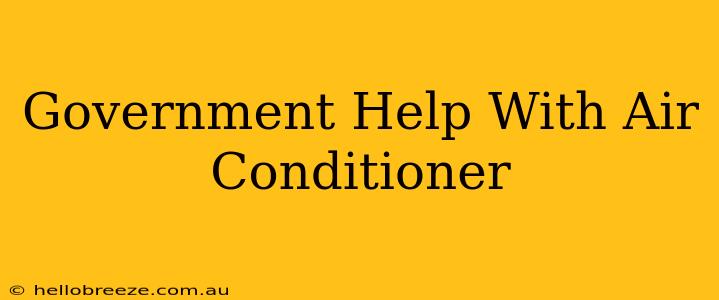Summer heat can be brutal, especially for those on a fixed income. Fortunately, several government programs offer assistance with air conditioner costs, helping you stay cool and comfortable without breaking the bank. This guide explores various avenues for obtaining government help with air conditioners, including financial assistance, energy efficiency programs, and other relevant resources.
Understanding the Need for AC Assistance
Many low-income households struggle to afford the upfront costs of purchasing and installing air conditioners, as well as the ongoing energy expenses. This can lead to serious health risks, particularly for vulnerable populations like the elderly and those with respiratory conditions. Extreme heat can exacerbate pre-existing health issues and even lead to heatstroke. Government programs recognize this critical need and offer various solutions to bridge this gap.
Who Qualifies for Government AC Assistance?
Eligibility criteria vary depending on the specific program and your location. Generally, programs prioritize households that meet low-income guidelines. This often involves demonstrating a household income below a certain percentage of the federal poverty level. Other factors considered may include:
- Age: Elderly individuals are often a priority for assistance.
- Disability: Those with disabilities may qualify for additional support.
- Household size: Larger families may be eligible for higher assistance levels.
- Medical conditions: Individuals with health conditions aggravated by heat are often given preference.
It's crucial to check the specific requirements of programs in your area.
Finding Government Assistance Programs for Air Conditioners
Locating the right program requires research. Start by exploring these avenues:
1. Your Local Department of Health and Human Services (DHHS):
Your local DHHS office is a valuable resource. They can provide information on local, state, and federal programs offering financial assistance for air conditioners. They may also be able to connect you with community organizations providing similar aid.
2. The Low Income Home Energy Assistance Program (LIHEAP):
LIHEAP is a federally funded program providing assistance to low-income households with energy bills, including cooling costs. While not always directly providing air conditioners, it can help with the energy expenses associated with running one. Check your state's LIHEAP website for details and applications.
3. State and Local Energy Assistance Programs:
Many states and local governments offer their own energy assistance programs, supplementing LIHEAP or offering unique benefits. These programs often focus on energy efficiency and may offer rebates or incentives for installing energy-efficient air conditioners.
4. Weatherization Assistance Programs:
Weatherization programs aim to improve the energy efficiency of homes. This can include installing better insulation, sealing air leaks, and sometimes, providing energy-efficient air conditioners or upgrades. Contact your local utility company or DHHS office to inquire about these programs.
5. Non-Profit Organizations and Charities:
Numerous non-profit organizations and charities offer assistance with home energy needs, including air conditioners. These organizations often have less stringent eligibility requirements than government programs. Search online for "air conditioner assistance [your city/state]" to locate potential resources.
Tips for Maximizing Your Energy Savings
Even with assistance, reducing your energy costs is crucial. These tips can help:
- Install a programmable thermostat: Control your cooling schedule and minimize energy waste.
- Use energy-efficient air conditioners: Look for models with a high SEER (Seasonal Energy Efficiency Ratio) rating.
- Regular maintenance: Regular cleaning and servicing can improve your AC's efficiency.
- Seal air leaks: Proper insulation and sealing can drastically reduce cooling needs.
Finding government help with air conditioners requires effort, but the potential savings and improved comfort are well worth the search. Start by contacting your local DHHS and exploring the resources outlined above. Staying informed and proactive will help you beat the heat and keep your energy bills manageable.

